The Origin of Lawsuits

Note: I originally wrote this for a legal client of mine, but it didn’t really suit their brand. I understood why, but I was still a little sad–after all, I thought it was a really interesting blog.
The Origin of Civil Trials & How We Got Here
England. 1166 AD.
King Henry II had just invented the closest version of a modern jury history had seen yet—a group of 12 men in each region who would hear cases and determine if a crime had been committed. Each jury would be responsible, then, for deciding how a person would be punished and for how long.
At the same time, laws in England had solidified into a set of statutes called “common law”—named for the fact that all members of society were bound to it in common. What had once been a hodge-podge of local rules and village declarations started to become a concrete framework. Everyone, from barons to blacksmiths, were bound by common law and bound by the ruling of the local jury.
As a result of harsh punishments, people fled to the only other legal recourse they had—the Ecclesiastical courts.
A Gentler, More Humane Court
See, the only segment of society that wasn’t tried by jury courts were clergymen—they were, luckily for them, tried in Ecclesiastical courts. Why was it more popular to be tried in Ecclesiastical courts? Because the Ecclesiastical courts were known for being far, far gentler than its secular counterpart.
Rather than consider the criminal laws in a case, these courts considered the loss of personal property and emotional loss experienced by those who were victims of the defendant’s actions. Its sentences, rather than including prison time or physical penalties, would only order the defendant to suffer a financial penalty. Just as importantly, they could force a defendant to cease the bad action that led to the wronged party’s damages.
Does that sound familiar?
The Ecclesiastical courts became known as courts of chancery, then courts of equity, until their name slowly evolved into what we know them today: civil courts.
And that, in a nutshell, is the origin story of tort law.
